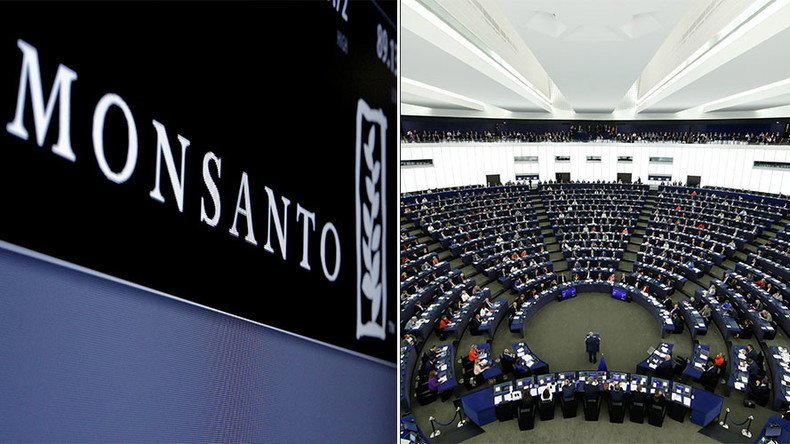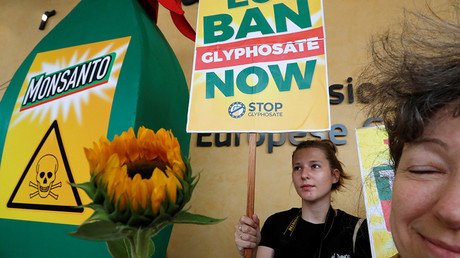MEPs agree to ban Monsanto lobbyists from European Parliament

European MPs agreed that lobbyists representing controversial US-based agricultural giant Monsanto should be barred from the European Parliament after the company refused to attend a hearing on allegations that it influenced studies on the safety of its products.
The measure includes meeting MEPs, attending parliamentary committee meetings and using the parliament’s digital resources in Brussels or Strasbourg, following a vote in which all major parliamentary factions supported the ban.
The move was confirmed by MEP Emmanuel Foulon and the co-chair of the Greens/European Free Alliance European parliamentary group, Philippe Lamberts, in respective tweets.
The formal process of denying company lobbyists access to the parliament still needs some time to be finalized, but the decision can be considered “effective immediately,” a spokesperson of the European Parliament’s president, Antonio Tajani, said as cited by the Guardian.
According to the British paper, it is the first time MEPs have applied new rules concerning the withdrawal of parliamentary access for company lobbyists.
The angry reaction was provoked by Monsanto’s refusal to attend a meeting with academics, regulators and campaigners on October 11, which was organized by the parliament’s environment and agriculture committees.
It was aimed at examining the company’s alleged influencing of studies conducted by various regulatory authorities on the safety of glyphosate, a key ingredient in its best-selling Roundup weed killer.
Glyphosate as well as the non-selective herbicide Roundup produced by Monsanto have long been a source of controversy that put the biotech corporation, which on its website claims to help farmers “grow food more sustainably,” at the center of scandals in recent years.
More than 900 people across the US are suing Monsanto as they were diagnosed with non-Hodgkin Lymphoma (NHL), a type of blood cancer that they link to exposure to glyphosate, according to law firm Baum, Hedlund, Aristei & Goldman.
However, the company said that the European Parliament’s hearing is not “an appropriate forum to consider” the issues related to the regulatory influence accusations, adding that it “refutes” all these allegations.
“It is not the role of the European Parliament to question the credibility of the scientific output of either the independent EU agencies or those in third countries,” Monsanto said in a statement, explaining its refusal, which was revealed by Foulon in a Twitter post.
NEWS:Les lobbyistes de #Monsanto officiellement interdits d'entrée o Parlement EU suite à leur refus de comparaître à l'audition #Glyphosatepic.twitter.com/fUjVwzkmb7
— Emmanuel Foulon (@efoulon1) September 28, 2017
“We have observed with increasing alarm the politicization of the EU procedure on the renewal of glyphosate,” Monsanto’s vice president, Philip Miller, said in this statement, adding that this procedure “should be scientific” but was “hijacked by populism in many respects.”
In response, Lamberts, who is also the European Green party leader, said that “those who ignore the rules of democracy also lose their rights as a lobbyist in the European parliament.”
“US corporations must also accept the democratic control function of the parliament. Monsanto cannot escape this,” he added as cited by the Guardian.
The EU Parliament’s decision was welcomed by some European NGOs. Martin Pigeon, a spokesman of the Corporate Europe Observatory, a non-profit research and campaign group monitoring the effect of corporate lobbying on European politics, praised the move by saying it was “extremely important that parliament has been prepared to meet Monsanto’s unbelievable arrogance with real retaliation and consequences.”
There have been scores of anti-Monsanto petitions and stories of people who claimed to have been affected by the company’s products in recent years. The corporate giant has been also at the center of reports claiming it has influence with the US government and, thus, avoids lawsuits.
Its activities even provoked the establishment of a global March Against Monsanto movement in 2013. The Facebook page of the initiative organizing protests against Monsanto has gathered about 1.4 million likes so far.
In 2015, the World Health Organization (WHO) classified glyphosate as “probably carcinogenic to humans.” The agricultural giant still fights this assessment. In August, it called for an investigation against the WHO, claiming that the international body ignored two major studies proving its harmlessness.
However, earlier the same month, leaked Monsanto internal documents released by LA-based Baum, Hedlund, Aristei & Goldman alleged that the company repeatedly tried to stop studies on its weed killer products that made them look bad.















